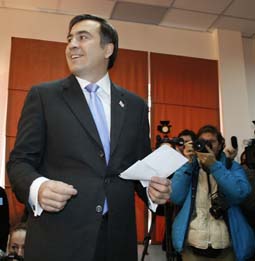Georgian voters go to polls for uncertain presidential election
By Messenger Staff
Saturday, January 5

“It’s not my fate, but Georgia’s fate that is being determined today,” incumbent candidate Mikheil Saakashvili told a throng of local and international news media after casting his vote.
Saakashvili, who stepped down from the presidency in late November to allow the snap election to go forward, called the election—more than a year early—on November 8, a day after police forcefully dispersed anti-government protestors in Tbilisi and a state of emergency was declared.
The anti-government protests, organized by an ad hoc coalition of opposition parties formed after the controversial arrest of an ex-minister in September, began on November 2.
Demonstrators soon demanded Saakashvili’s resignation. The rally dragged on with dwindling numbers until riot police moved in to clear them off the streets on November 7, with the resulting violence escalating throughout the day.
The election’s fairness was immediately called in question, with Saakashvili unofficially beginning his campaign while the country was still under emergency rule and a media clampdown.
Acting president Nino Burjanadze has pledged entirely free and fair elections, and hundreds of international observers have been invited to Georgia.
The presidential campaign, however, has been deeply sullied by accusations of intimidation and abuse of state resources by Saakashvili’s ruling National Movement party, and government allegations that prominent figures among the fractious opposition, particularly billionaire candidate Badri Patarkatsishvili, are planning a post-election coup attempt.
A report from the National Democratic Institute described the political environment as polarized, adding, “Many Georgians expressed to us that this polarization may undermine confidence in, and challenge the credibility of the upcoming presidential poll.”
Georgians will also vote on two non-binding referendums today: one asking whether parliamentary elections should be rescheduled for spring, the other on whether they support Georgian membership in NATO. Both are expected to pass with sound majorities.
Opposition campaigners have loudly accused the government of planning to rig the election, and are scheduling post-election rallies to release their own count of the votes.
Local polling has varied wildly in credibility and results, but most surveys suggest Saakashvili leads closest competitor Levan Gachechiladze, the joint candidate of a nine-party opposition coalition. Analysts—and voters—are split on whether Saakashvili can be expected to win more than half the votes in today’s poll, which he will need to avoid a runoff.
On Thursday, a well-known American polling firm, hired to help Saakashvili’s campaign, released the results of a poll from early December which show the incumbent within reach of a win today.
“I will put our global credibility on the line by saying… [Saakashvili] may well win an outright majority on January 5,” Jeremy Rosner, executive vice president of Greenberg Quinlan Rosner Research, told journalists in a conference call. “And there should not be a significant sense of surprise in Georgia or the international community.”
In a “conservative” projection, the poll predicted that likely but undecided voters could hand Saakashvili a slim majority win, with 52 percent of the vote against 21 percent for opposition coalition candidate Gachechiladze. The margin of error is 3.4 percent.
Opposition representatives dismissed the poll, paid for by Saakashvili’s campaign, as biased.
If Saakashvili avoids a runoff by officially winning more than half the votes today, opposition leaders are likely to publicize conflicting results and claim the vote was rigged.
The election itself looks unlikely to resolve the recent upsurge in political unrest—instead, the country’s stability and democratic tendencies will be most put to the test in the days after a winner is declared.
For up-to-the-minute coverage of Election Day results, go to the Messenger's Election Day blog.
